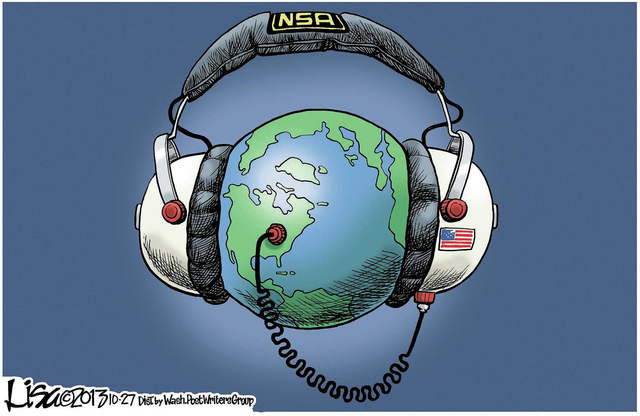USA Freedom Act would right a wrong
In today’s world of technology and terrorism, there is a fine line between privacy and protection. That line has been exposed by recent revelations that the federal government, through the National Security Agency, has been collecting information about millions of Americans.
“The privacy and dignity of our citizens are being whittled away by sometimes imperceptible steps,” wrote Justice William Douglas in 1966. “Taken individually, each step may be of little consequence. But when viewed as a whole, there begins to emerge a society quite unlike any we have seen — a society in which government may intrude into the secret regions of a person’s life.”
That is how Justice Douglas once described the tension that exists as technological advancements continue to be a part of our nation’s current justice system.
It is out of respect for personal privacy that Congress must take great care to protect Nevadans from the whittling away of our freedoms, even when attempting to protect us from those who wish us harm.
My concern about the tension between personal privacy and protecting Americans led me to vote repeatedly against the Patriot Act. And now, as press reports worldwide publicly confirm that the United States is operating programs to sweep up millions of bulk communication logs of law-abiding citizens, our nation must again find that balance.
These programs, which operate through the National Security Agency, are collecting these call records as part of the war on terror. They are mostly authorized by Section 215 of the Patriot Act. Section 215 permits the FBI to seek a court order directing a business to turn over records when there are reasonable grounds to believe that the information sought is relevant to an authorized investigation of international terrorism.
“Relevance” has been found by the courts to be a broad standard that permits large volumes of data to be collected to identify smaller amounts of information relevant to an ongoing investigation.
The courts have said it is reasonable to believe that, when queried, this data is likely to produce information that will help the FBI during a terrorist investigation.
As a result, this practice has implicated Nevadans and millions of other Americans’ call records.
Even worse, the practice authorized by Section 215 of the Patriot Act has only solved two FBI investigations into terrorism. Invading Nevadans’ privacy for years to solve two terrorism investigations simply is not reasonable.
I believe these programs are an invasion of your privacy that is protected by the Fourth Amendment to the Constitution.
Today, I am trying to stop it, which is why I have reached across the aisle to team up with the Democratic chairman of the Senate Judiciary Committee, Patrick Leahy, D-Vt., to introduce the USA Freedom Act.
This legislation will, among other things, rein in the dragnet collection of data by the NSA. It will end the bulk collection of Americans’ communication records by halting the authorization provided by Section 215 of the Patriot Act.
The USA Freedom Act requires proof that records sought are relevant and material to an authorized investigation into international terrorism or clandestine intelligence activities. It also warrants proof that these activities relate to a foreign power or agent, or at least an individual in contact with a foreign power or agent.
Most likely, these conditions fall in line with what many Americans assumed their government already required.
The USA Freedom Act also addresses other needs to reinforce our privacy rights. It increases transparency of Foreign Intelligence Surveillance Court decision-making processes, allows businesses to release information regarding FISA requests, and puts an earlier sunset on the FISA Amendments Act so that it and three Patriot Act provisions expire at the same time. This adjustment is necessary for Congress to have a comprehensive debate about this nation’s surveillance programs.
I believe that we need major changes to our current surveillance system. In the meantime, I am also working with Sen. Al Franken, D-Minn., to bring greater transparency to these programs and allow companies that have been served a subpoena to share basic information with their customers.
We can, at the very least, shed light on these practices while Congress works through greater reforms.
The recent revelations about the ongoing surveillance programs provide a unique moment in time. Members of Congress from both sides of the aisle are working right now to seize this moment and make significant changes that will ensure the rights of millions of Americans. It is time to stop the practice of bulk data collection.
Dean Heller, a Republican, is a U.S. senator representing Nevada.

















